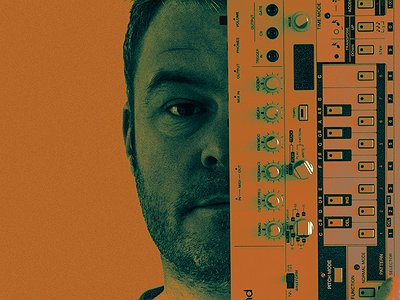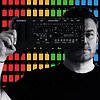Part 2
Could you take us through a day in your life, from a possible morning routine through to your work? Do you have a fixed schedule? How do music and other aspects of your life feed back into each other - do you separate them or instead try to make them blend seamlessly?
I have been full time in music for over 25 years now. I get up early to do the school run, having kids really helped me get my day into a schedule, as making music all through the night and sleeping all day just messes with my head in more ways than one, add to that a busy touring schedule, I would loose touch with reality.
I get up. Deal with shit emails then try to make music as quickly as possible, with the music as low as possible, so my ears are not burnt out after a few hours. I will work right through until about 7pm, have dinner then go back for a few hours. This always seems to be the golden time when magic happens, but I need to have fucked about most of the day on shit ideas first ... I then like to switch off even if I am buzzing so that I can take that excitement of looking forward to the next day. I try not to rush things and jam for hours, days until I am happy to record. Sometimes I am scared to record in case I can’t capture the feeling!
If I am driving my car, I try to sync the window wipers with the beats playing on the radio, I play drum patterns on my steering wheel and search for loops in my heard constantly. If I am not in conversation I am thinking about music or looking for ideas. It consumes me, but it’s an addiction I am happy to admit to.
Could you describe your creative process on the basis of a piece or album that's particularly dear to you, please? Where did the ideas come from, how were they transformed in your mind, what did you start with and how do you refine these beginnings into the finished work of art?
Acid & Eve (my latest album) was me just going back to what got me excited about dance music, the raw power of drum machine patterns and squelching baselines. The joy of having space between the kick drums, and really hearing the reverbs and delays on rim shots etc. Acid House was my Punk Rock and I wanted to make an album that paid homage to those early machines that changed my life. When Roland released the Aira range I held back for about a year because I had the original machines, then one day I decided to check them out and boom, they started a fire in me. I bought it all and from the first jam I knew it would be great to make a record using this hardware. I made an album using my DAW and soft synths but kept stripping it back until I was only using Aira and Boutique equipment. It was a labour of love, sequencing on the machines a lick I could have played on my DAW in about 3 seconds but I knew the over all finished product would mean much more to me and anyone else who is remotely interested in these machines. They are responsible for the music we call Dance Music.
I looked at all my favourite Acid House tracks and producers, made some mix tapes and listened to them constantly and nothing else - the drum patterns, the simplicity of the baselines and vocals. I started enjoying what they were doing, there was no extra production or swooshes’ etc , no soft synths, it was just machines with the human touch adding the magic, even in the song structures. I even took this concept into the artwork and started mixing glass paints and chemicals to make art that forced the viewer to try and make sense of what they were seeing, just the way Acid House pushes the listener to try and make sense of what they are hearing ... I think a lot of music produced now is from sample packs and pre-sets packs; I just had to get away from all that.
There are many descriptions of the ideal state of mind for being creative. What is it like for you? What supports this ideal state of mind and what are distractions? Are there strategies to enter into this state more easily?
The older I get the harder I find it to make music. I am always questioning myself – have I done this before or is that good enough? etc. I used to get very frustrated on tour and smash a lot of things up. Now when I get frustrated with making music I go to my garage and paint, this lets me relax and forget about everything. When my head is clear I go back to the studio to make music. You really need to have a clear head and just make music for you, without any pressure or competition.
Distraction can be a knock at the door, because you can’t always keep reality out the studio. It’s a very selfish environment. That’s no one really understands unless they themselves have been there.
Too may artists just seem to be copying each other, doing a genre that their friends are doing or had success with and they get in competition with each other until someone has the balls to jump to the next genre. If everyone was honest with themselves and made the music they truly wanted to make I think things would be more interesting to the listener and rewarding for the artist.
How is playing live and writing music in the studio connected? What do you achieve and draw from each experience personally? How do you see the relationship between improvisation and composition in this regard?
These elements are so tightly connected, I am so lucky to be able to try out my early production ideas as a DJ and also perform live shows to crowds that know what I am all about and are happy to indulge my musical experiments. I write music keeping in mind, what it will sound like on a big system and always look forward to truly hearing it in that environment. When you play it on one that also gives you inspiration on sounds and structure that I don’t think you will ever find in a studio unless you have a massive club system to compare with. Knowing what sounds work and how long to hold them for on a build etc, all come from experimenting and playing live, it's really like what came first the chicken or the egg – the live track or the record ??
How do you see the relationship between the 'sound' aspects of music and the 'composition' aspects? How do you work with sound and timbre to meet certain production ideas and in which way can certain sounds already take on compositional qualities?
I think they go hand in hand, the sound informs the structure and vice versa. This question also makes my head hurt as I try to give an answer that I am happy with! lol
Our sense of hearing shares intriguing connections to other senses. From your experience, what are some of the most inspiring overlaps between different senses - and what do they tell us about the way our senses work? What happens to sound at its outermost borders?
I wish I knew, music is and always has been a huge part of my life, it can provide me with energy, knowledge and fill my heart full of love and sometimes even a welcome sadness. I have always called it a drug, possibly the only safe drug. I got addicted as a teenager. It filled my empty room with possibilities and took me to magical places … My addiction got so bad, I had to make my own to supply my habit, from there I started to sell it which gave me more money to buy even more equipment. I get to deal my music all over the world while feeding my huge addiction.
Art can be a purpose in its own right, but it can also directly feed back into everyday life, take on a social and political role and lead to more engagement. Can you describe your approach to art and being an artist?
I paint pictures using only my hands / fingers pushing and pulling, mixing the paint because the moment I try to use a brush I think I would be pretending to be someone I am not - I am just a guy that likes to make pictures that push the viewer to try and make sense of what they are looking at. I have the same approach to music, I don’t know, I feel for the right key or chord and have never once considered myself a musician. I think the moment I do I will stop. It starts off with an idea in my head that I need to get onto canvas or a sequencer but I am also very aware. Happy accidents are the eureka moment, the spark of originality that make what you are working on become special.
It is remarkable, in a way, that we have arrived in the 21st century with the basic concept of music still intact. Do you have a vision of music, an idea of what music could be beyond its current form?
I fear, as our attention span becomes shorter, no thanks to technology, our interest in listening to music, specifically in the LP format will dwindle. It will be too much time for future generations to invest in. It’s already becoming harder and harder to make a living from making music. The same could also apply to film and art ... Everything’s NOW NOW NOW, cut to the good bit and flick to the next. Good music/art demands and deserves our attention but technology tries to save us time?? Maybe music will end up just a string of sounds without melodies or structure?






